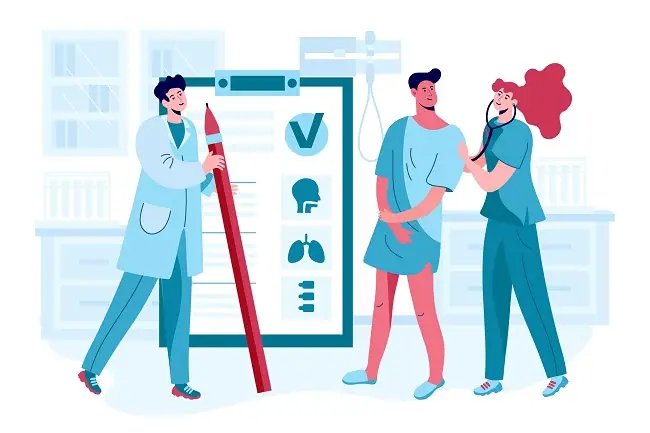Getting a comprehensive checkup is crucial for understanding your health from every angle. These thorough evaluations play a vital role in catching potential issues before they become serious problems. Taking a proactive approach to your health empowers you to identify and prevent issues before they escalate. Throughout this article, we will delve into various types of full body checkups, providing you with the insights needed to make educated choices about your overall well-being.
Understanding Full Body Checkups
A full body checkup is like a deep dive into your overall health. It’s often referred to as a master health exam and covers vital signs, general health assessment, and checks for common medical conditions.

Depending on the type you choose, various tests and examinations may be involved.
1. Basic Checkup
A basic checkup gives you a fundamental overview of your health. It starts with a detailed physical examination by a healthcare professional. They monitor vital signs like body temperature, heart rate, and blood pressure, while also reviewing your medical history. This initial assessment sets the baseline for further evaluations and helps identify urgent health issues. It covers essential health parameters such as blood pressure, blood sugar, cholesterol levels, and heart health. It’s perfect for those looking for a general snapshot of their health.
The basic full body checkup is an entry-level package that covers essential health parameters. It includes:
● Blood pressure measurement
● Blood sugar levels
● Lipid profile (cholesterol levels)
● Complete blood count (CBC)
● Urine analysis
● Body mass index (BMI)
● Electrocardiogram (ECG) for heart health
This package is a good starting point for those seeking a general overview of their health.
2. Comprehensive Full Body Checkup
For a more detailed analysis, the comprehensive full body checkup is an excellent choice. It includes a wider range of tests like blood tests for lipid profiles, glucose levels, and in-depth liver and kidney function tests. This comprehensive approach provides a detailed view of your internal health and can identify early signs of chronic conditions like diabetes, hypertension, and cholesterol problems. It’s ideal for individuals seeking a thorough evaluation of their health, including respiratory and cardiovascular fitness.
The comprehensive full body checkup is a more extensive evaluation that goes beyond basic and advanced assessments. It includes:
1. All tests from the basic and advanced checkups
2. Pulmonary function tests
3. Stress test
4. CT scan of the abdomen and pelvis
5. Carotid ultrasound for assessing the carotid arteries
6. Additional specialized tests, such as cancer markers
This package is suitable for individuals looking for a more in-depth assessment of their health, including cardiovascular and respiratory fitness.
3. Gender-Specific Checkups
Men and women have different health needs, and gender-specific checkups cater to these differences. These specialized evaluations take into account specific health risks and concerns associated with each gender. For example, men might undergo screenings for prostate cancer, while women might have checks for breast and cervical cancer. These gender-specific assessments ensure a comprehensive evaluation, promoting early detection and prevention.
4. Age-Specific Checkups
As we age, our health needs change, making age-specific full body checkups essential. These examinations focus on issues like osteoporosis, arthritis, and age-related vision problems. By tailoring the checkup to your age group, healthcare providers can efficiently detect and manage age-related diseases.
Benefits of Full Body Checkups
Regular full body checkups offer numerous advantages, including early problem detection, a thorough health evaluation, risk assessment for common diseases, reduced health-related stress, and personalized health recommendations from experts. These exams empower you to actively monitor your health and take control of your well-being.
Conclusion
Full body exams are invaluable for a comprehensive assessment of your health. Understanding the available types of full body checkups enables you to choose the one that fits your risk factors and health concerns. Regular checkups are essential for early detection, risk assessment, and maintaining a proactive approach to your health. To find the most suitable full body examination for your unique health needs and goals, consulting with a healthcare professional is key.







